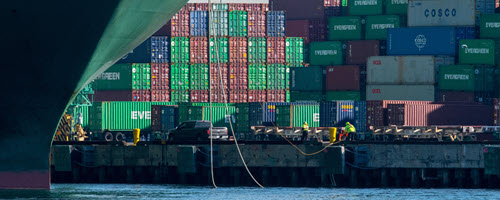|
|
|
|
|
|
|
|
|
|
The Morning Risk Report: A Devastating Fire at a Major Ford Supplier Will Disrupt Business for Months
|
|
By Richard Vanderford | Dow Jones Risk Journal
|
|
|
|
|
|
|
Good morning. A late-night fire leveled a key part of a New York aluminum plant in hours. Its absence is going to disrupt business at Ford Motor and other automakers for months to come.
-
Key supplier: The plant’s operator, Atlanta-based Novelis, supplies about 40% of the aluminum sheet used by the auto industry in the U.S., according to industry analysts. Novelis said a major portion of its Oswego, N.Y., plant has been knocked offline until early next year.
-
Tons and tons: Novelis produces more than 350,000 metric tons of sheet aluminum annually for the automotive industry, according to industry analysts. Around a dozen automakers get aluminum from Novelis, including Ford, Toyota, Hyundai, Volkswagen and Jeep maker Stellantis, according to a regulatory filing.
-
Latest issue: It is the latest supply-chain snafu for the global auto industry, roiled in recent years by the Trump administration’s trade wars, a global semiconductor shortage and a potentially crippling reliance on China for rare-earth magnets used in electric and other vehicles.
-
Supply-chain bottleneck: Though automakers and other major industrial manufacturers worked to diversify their supply chains in the wake of the coronavirus pandemic, which shut off access to Chinese factories, companies often remain largely dependent on one or two makers for critical parts because of the high cost tied to employing multiple suppliers.
|
|
|
|
|
Content from our sponsor: Deloitte
|

|
|
6 Forces Shaping the Future of Freight
|
|
Explore several key trends poised to impact global freight and logistics operations, and learn why recognizing these developments is critical for strategic decision-making. Read More
|
|
|
|
|
|
|
|
|
|
|

|
|
The Office of the Comptroller of the Currency and the Federal Deposit Insurance Corporation have given the public and industry 60 days to submit comments on the proposed rule. Photo: Getty Images
|
|
|
|
|
|
Banking regulators to bar consideration of reputation risk.
Two U.S. banking regulators are looking to rid reputation risk as a factor in their supervisory programs to address the so-called “debanking” phenomenon, Risk Journal reports.
The Federal Deposit Insurance Corporation and the Office of the Comptroller of the Currency on Tuesday proposed a new rule that would prohibit them from taking enforcement actions against or criticizing a bank based on reputation risk.
|
|
|
|
|
Pemex bribery defendant moves to dismiss after trial delay.
A Texas oil businessman moved to dismiss U.S. Justice Department foreign bribery charges against him after a trial for the case was postponed, arguing the delay hurts him and benefits prosecutors.
U.S. District Judge Kenneth Hoyt decided to delay the trial against Ramon Alexandro Rovirosa Martinez last week after prosecutors disclosed that they had failed to turn over some 735,000 records they acquired from one of the defendant’s alleged co-conspirators, defense counsel said in a filing in Houston federal court.
|
|
|
|
-
California has enacted tougher rules preventing corporate investors such as private-equity firms from meddling in healthcare decisions, while the industry waits for Gov. Gavin Newsom’s decision on a second, similar bill.
-
A small activist shareholder group with a stake in Wells Fargo is calling on the bank to restore a policy that required an independent board chair, reviving a long-running corporate governance debate about the practice of a company’s chief executive officer also serving as chair of the board.
-
The U.S. Treasury’s Office of Foreign Assets Control has sanctioned eight Mexican individuals and 12 Mexico-based companies affiliated with the Sinaloa Cartel’s Los Chapitos faction for supplying illicit fentanyl precursor chemicals to the designated terrorist organization blamed for a significant portion of deadly drugs trafficked into the U.S.
|
|
|
|
|
|
|
|
|
|

|
|
The World Trade Organization sees global trade in goods increasing more rapidly than previously expected. Photo:Agence France-Presse/Getty Images
|
|
|
|
|
|
Global trade growth to be stronger than expected, WTO says.
Global trade in goods will increase more rapidly than previously expected this year as purchases of goods related to artificial intelligence surge and a buildup in inventories in the U.S. softens the impact of higher tariffs, the World Trade Organization said Tuesday.
However, the Geneva-based dispute resolution body expects exports and imports of goods to grow at a slower pace in 2026 as the tariff rises implemented by the U.S. and in retaliating countries take full effect.
|
|
|
|
|
Jaguar Land Rover to restart further production after cyberattack.
Jaguar Land Rover launched a new plan to help boost cash flow for its suppliers as it announced the restart of further manufacturing after a crippling cyberattack.
Certain suppliers that are critical to the automaker’s restart of production will now receive cash upfront, with the plan soon set to be expanded to others, including some nonproduction suppliers. The move comes after the U.K. government recently stepped in to provide financial support for the company.
|
|
|
|
|
|
|
|
|
|
|
|
-
Compensation or culture? The best-managed companies lean into both.
-
Retailers are sitting on a pile of goods. Now the question is, will the U.S. holiday shopper bite?
-
Brands that fear for their survival unless they can connect with young people are fueling a boom in the business of Gen Z translation.
-
The White House says federal workers’ shutdown back pay isn’t guaranteed.
|
|
|
|
|
|
|
|
|
|
|
|
|
|
|
|